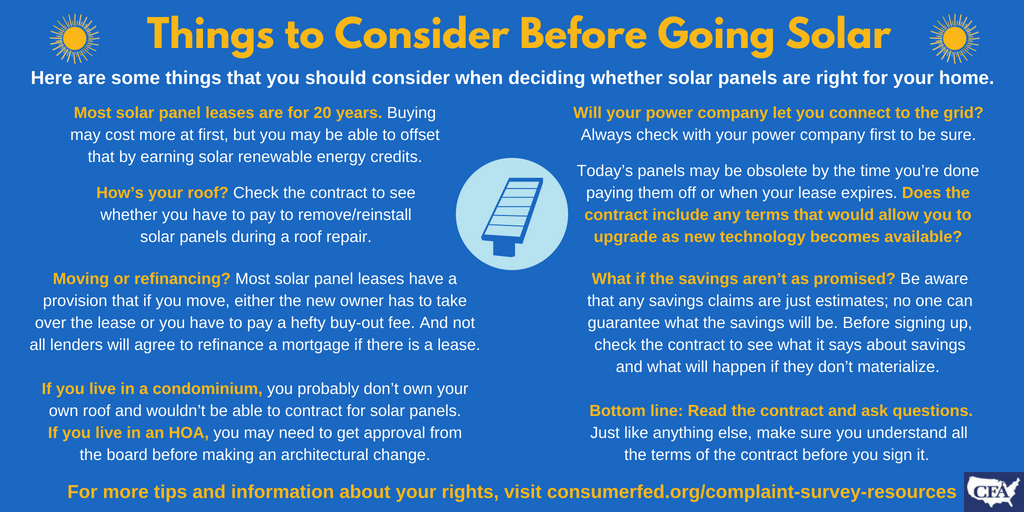The solar panel industry is growing rapidly and it’s pretty clear why. Who can resist the promise of saving money while also helping the planet?
Unfortunately, not everyone comes away from the deal happy. Here are some things that you should consider when deciding whether solar panels are the right choice for your home.
Lease vs. Buy
Leases can be attractive because they don’t require a large up-front payment. Most solar panel leases, however, are for 20 years, which is a pretty long time to lease something. Buying may cost more at first, but you may be able to offset that by earning solar renewable energy credits.
Will your power company let you connect to the grid?
Some consumers who bought solar panels reported problems in getting their power company to let them connect to the grid. Some power companies may charge a fee, while others may put a cap on how many homes can connect. Always check with your power company first to be sure.
What if you want to move or refinance?
Most solar panel leases have a provision that if you move during the lease term, either the new owner has to take over the lease or you have to pay a hefty buy-out fee. Similarly, we’ve heard reports that not all lenders will agree to refinance a mortgage if there is a lease.
How’s your roof?
Your roof may be okay now, but eventually it’ll need to be fixed or replaced. Check the contract before to see whether you have to pay to remove and reinstall the solar panels. Also, who would be responsible for any damage to the roof during installation?
Condominiums and homeowners’ associations
If you live in a condominium, you probably don’t own your own roof and wouldn’t be able to contract for solar panels. If you live in an HOA, you may need to get approval from the board before making an architectural change. Check with your state or local consumer agency to find out whether there are any laws regarding whether an association can deny your request entirely or require specific placement for the panels.
Technology changes
Do you still use the same computer or cell phone as you did 10 or 15 years ago? Chances are you answered no to both. Keep this in mind when thinking solar panels. As technology advances, today’s panels may be obsolete by the time you’re done paying them off or when your lease expires. Does the contract include any terms that would allow you to upgrade as new technology becomes available?
What if the savings aren’t as promised?
Consumers sometimes complain that they never saw the savings on their utility bills that they were promised. Be aware that any savings claims are just estimates; no one can guaranty what the savings will be. Before signing up, check the contract to see what it says about savings and what will happen if they don’t materialize. Most contracts won’t give you the opportunity to cancel if that happens, but may offer a credit. If you’re given an estimate for savings but it’s not stated in the contract, insist that it be written in. And if the salesperson guarantees that you’ll save a specific amount of money, take your business elsewhere.
Bottom Line: Read the contract and ask questions
Just like anything else, make sure you understand all the terms of the contract before you sign it. Never feel pressured into signing it before you’re ready. If the salesperson promised you something, be sure it’s there in writing. If you are supposed to get a tax credit, check to make sure it’s still available. Familiarize yourself with your cancellation rights. This varies by state, but you may have little or no time to change your mind after signing the contract.
Many people love their solar panels. They’re happy to help the environment while putting a little change in their pockets. We only hear from the people who’ve had a problem. If you decide solar panels are right for you, do your homework first and know what you’re agreeing to and you’ll have a better chance of being happy with your decision.

This blog is one of a series of articles contributed by state and local consumer agencies in connection with the annual survey about consumer complaints conducted by Consumer Federation of America. The survey report provides “real life” examples of complaints and tips for consumers. Have a consumer problem or question? Find your state or local consumer agency at https://www.usa.gov/state-consumer.

